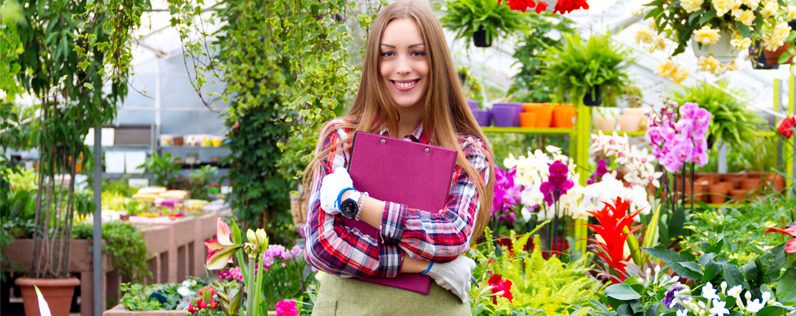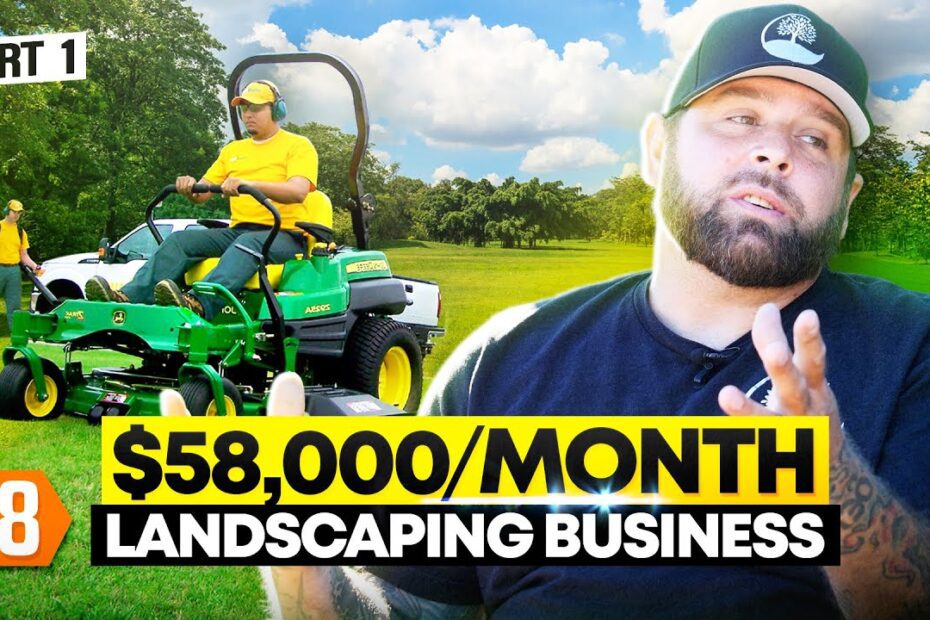To start a gardening business, you will need to have some basic supplies, including seeds, soil, pots or containers, and gardening tools. You will also need to decide what type of garden you want to grow and what plants or flowers you want to sell. Once you have your supplies and your business plan in place, you can start advertising your business and selling your plants or flowers.
- There are a few steps to take when starting a gardening business: 1
- Choose what type of gardening business you would like to start
- This can include lawn care, landscape design, or even a plant nursery
- Draw up a business plan that outlines your goals and how you plan on achieving them
- This will help you stay organized and on track as you get started
- Get the necessary licenses and permits for your business
- Depending on your location, this may require registering with the city or county clerk’s office
- Purchase any equipment or supplies you need to get started
- This can include things like lawnmowers, shovels, wheelbarrows, etc
- Start marketing your business! Let people in your community know that you’re available for hire by passing out flyers, posting signs around town, or even starting a website or social media page
Gardening Business Start-Up Costs
Starting a gardening business can be a fun and rewarding way to turn your love of plants and gardening into a profitable endeavor. But before you get started, it’s important to understand the start-up costs associated with starting a gardening business.
The biggest cost when starting a gardening business is usually the cost of acquiring the necessary tools and equipment.
Depending on the size and scope of your business, you’ll need to invest in things like lawn mowers, edgers, trimmers, shovels, rakes, hoses, and more. The good news is that many of these items can be purchased used at a fraction of the cost of buying them new. However, you’ll still need to factor in the cost of maintaining and repairing your equipment over time.
In addition to equipment costs, you’ll also need to factor in the cost of supplies like seedlings, potting soil, mulch, fertilizers, plant pots, etc. These costs will vary depending on where you source your supplies from but should be relatively easy to estimate once you have a few suppliers in mind.
Labor is another significant cost associated with starting a gardening business.
If you plan on doing all the work yourself then obviously this won’t be an issue but if you plan on hiring employees or contractors then labor costs can quickly add up. In addition to wages/salaries, don’t forget to factor in things like workers compensation insurance (if required by law), payroll taxes ,and other employee benefits .
Finally ,you’ll need to factor in general operating expenses like office space rental or mortgage payments , marketing and advertising expenses , licenses and permits , accounting and legal fees , etc .
All these factors will play a role in determining how much it will ultimately cost to start your own gardening business .
Gardening Business Plan Pdf
If you’re thinking of starting a gardening business, then you’ll need to put together a solid business plan. This doesn’t have to be a complicated document – but it should cover all the key points about your business. Here’s a quick overview of what should be included in your gardening business plan:
1. Executive summary
This is a brief overview of your business, including your goals and objectives. Keep it short and to the point – you can flesh out the details later on.
2. Company description
Here’s where you talk about what your company does, as well as its history (if any). Include information about any unique selling points that make your company stand out from the competition.
3. Market analysis
Research your target market and explain who will be buying your products or services, and why they need them. This is an important section, as it will help you determine pricing and marketing strategies later on.
How to Get Clients for a Gardening Business
If you’re starting a gardening business, one of the most important things you’ll need to do is get clients. After all, without clients, you won’t have any work to do! So how can you go about getting clients for your new business?
Here are a few ideas:
1. Start by letting your family and friends know that you’re available for gardening work. They may not need your services right away, but they can spread the word to others who might be interested.
2. Get involved in your local community. Attend community events and meetups, and let people know that you offer gardening services.
3. Advertise in local newspapers or online classifieds websites.
This is a great way to reach potential customers who might not otherwise hear about your business.
4. Make sure your website is up-to-date and includes information about your services and contact information. Potential clients will likely look you up online before hiring you, so make sure they can easily find what they’re looking for!
Gardening Business near Me
If you’re looking to start a gardening business, there are a few things you need to know. First, you need to have a passion for plants and gardening. This will help you be successful in your business venture.
Second, you need to have the proper knowledge and skillset to care for plants properly. And lastly, it’s important to have the right location for your business. If you live in an area with a lot of foot traffic, this would be the ideal spot for your business.
However, if you live in a more rural area, you’ll likely want to choose a spot that’s closer to town or city limits. Once you’ve decided on the perfect location for your gardening business, it’s time to get started!
Is a Gardening Business Profitable
A gardening business can be a very profitable venture. There are many factors to consider when starting a gardening business, such as the initial investment, the type of plants you will grow, the climate in your area, and your target market.
If you have a green thumb and a passion for plants, then a gardening business may be the perfect opportunity for you.
With some careful planning and hard work, you can turn your love of gardening into a successful business. Here are some tips to help you get started:
1. Decide what type of plants you want to grow.
There is a wide variety of plants that can be grown for profit, so it’s important to choose those that will do well in your climate and that there is a demand for in your area. Do some research to find out what types of plants are popular and in demand in your area.
2. Start small and expand gradually.
It’s important not to bite off more than you can chew when starting a gardening business. Start with a small plot of land or even just containers if that’s all you have available. You can always expand later as your business grows.
3 . Invest in quality tools and supplies . Having high-quality tools and supplies will make it easier to take care of your plants and produce quality results that customers will be willing to pay for .
Do some shopping around to compare prices on different items before making any purchase s .
4 . Promote your business .
Make sure potential customers know about your gardening business by promoting it through word-of-mouth , flyers , or online ads . Get creative and come up with an effective marketing strategy that fits within your budget .
Gardening Business Ideas
When it comes to starting a gardening business, there are plenty of options to choose from. Whether you want to start a small, local operation or something on a larger scale, there’s definitely a niche for you. Here are just a few ideas to get you started:
1. Start a landscaping business. This is probably the most popular option when it comes to starting a gardening business. If you have experience with landscaping and lawn care, then this could be the perfect option for you.
You can start small by offering your services to friends and family, and then eventually expand your clientele by advertising online or in your local community.
2. Start a garden design business. Do you have an eye for detail and a passion for plants?
Then starting a garden design business could be right up your alley! You can offer your services to clients who need help planning and designing their outdoor spaces. This can include anything from creating detailed plans to selecting the right plants and materials.
3. Start an organic gardening business . More and more people are looking for ways to eat healthy, organic food – so why not start an organic gardening business? You can grow fruits, vegetables, herbs, and other plants using sustainable methods that don’t rely on harmful chemicals or pesticides .
This type of business is perfect if you have access to some land where you can set up your garden . Plus , it’s a great way to promote healthy eating habits!
4..
Start A Plant Nursery Business : Have lots of green fingers ? One entrepreneurial idea is setting up shop as mobile plant nursery .This involves selling seedlings , young trees , flowers ,and other types of plants from market stalls or door-to-door .To make things easier (and more cost effective) many plant nurseries now operate online via eCommerce platforms like Shopify .If this idea interests you ,be sure check out our guide on how open an online store .
5..Start A Garden Maintenance Service: If love getting stuck into some serious weeding but don’t relish the thought of going solo , consider teaming up with others in the industry by setting upa garden maintenance service company ! This type of venture offers numerous opportunities including working as part of team maintaining large estates or private gardens belonging high net worth individuals (HNWIs).
Gardening Business for Sale
Are you passionate about gardening and plants? Do you have a green thumb? If so, then owning your own gardening business may be the perfect opportunity for you!
A gardening business for sale can provide you with a steady income and the ability to work outdoors in nature.
There are many things to consider when purchasing a gardening business, such as the type of products or services you will offer, your target market, and your marketing strategy. You will also need to create a business plan and financial projections.
But don’t worry – we’re here to help!
In this blog post, we’ll cover everything you need to know about buying a gardening business. We’ll discuss the benefits of owning your own business, what to look for when purchasing one, and how to get started.
By the end of this post, you’ll be ready to start shopping for your new venture!
Online Gardening Business
If you’re thinking about starting an online gardening business, there are a few things you need to know. First, you’ll need to decide what type of gardening business you want to start. Do you want to sell plants and flowers?
Or do you want to offer services like lawn care or landscaping?
Once you’ve decided on the type of business you want to start, it’s time to start building your website. You’ll need to choose a domain name and hosting package, and then design your site.
If you’re not sure how to do this yourself, there are plenty of web designers who can help.
Once your site is up and running, it’s time to start promoting it. You’ll need to make sure potential customers can find your site when they search for gardening businesses online.
You can do this by optimizing your site for search engines and getting listed in directories. You should also consider running ads on gardening-related websites or setting up a blog about gardening tips and advice.
By following these steps, you can launch a successful online gardening business that will bring in customers from all over the world!

Credit: www.constantcontact.com
Are Gardens Profitable?
No definitive answer exists to this question since it can vary greatly from one garden to the next. However, in general, gardens can be quite profitable if they are managed correctly. The key is to produce a high quantity and variety of crops while keeping costs low.
This can be done by using organic methods, starting with quality seeds, and using efficient irrigation systems. If you are able to sell your produce directly to consumers, you can further increase your profits by eliminating the middleman. In short, yes, gardens can be very profitable if done right!
How Do I Start a Garden With No Money?
Assuming you have no money to spend on a garden, there are a few ways you can go about starting one.
One option is to start by foraging for plants that can be used in your garden. This may include dandelions, clover, plantain, and other weeds that are commonly found in yards.
You can also look for edible mushrooms in your area. Once you have collected these plants, you will need to research how to properly prepare them for planting. This may involve blanching, drying, or freezing the plants.
Another option is to start a seed bank. This can be done by collecting seeds from fruits and vegetables that you eat. You will then need to dry and store the seeds properly so that they remain viable.
When you are ready to start your garden, you can sow the seeds indoors or outdoors depending on the type of plant.
If you have access to some land, another option is to sign up for a CSA (Community Supported Agriculture) program. With this program, farmers allow individuals or families to pay upfront for a share of their harvest.
In return, members receive fresh produce throughout the growing season. This is a great way to get locally grown food at a discounted price (or even free).
Starting a garden doesn’t have to be expensive – there are plenty of ways to do it for free or very cheap!
How Do Beginners Start a Garden?
If you’re new to gardening, it can be overwhelming to think about starting your own garden. But don’t worry! With a little planning and some basic knowledge, you can start a beautiful garden that will thrive for years to come.
Here are some tips to get you started:
1. Choose the right location. When selecting a spot for your garden, make sure it gets plenty of sunlight and has good drainage.
Avoid low-lying areas where water can pool, as this can drown your plants.
2. Prepare the soil. Once you’ve chosen your location, it’s time to prepare the soil.
This involves removing any weeds or debris, and loosening up the dirt so that roots can easily penetrate it. You may also want to add some compost or other organic matter to improve the quality of the soil.
3. Select your plants carefully.
Not all plants are suitable for beginner gardens – some require more care than others. Do your research beforehand so that you choose plants that will fit with your level of experience (and available time). Succulents and hardy annuals are usually good choices for beginners.
4 Start small & simple . It’s tempting to want to cram as many plants into your garden as possible, but resist the urge! Starting small will give you a chance to learn how to care for your plants without feeling overwhelmed by a large space.
. 5 Pay attentionto watering needs . One of the most important things you need to do as a gardener is water your plants regularly – but not too much! Each plant has different watering needs, so make sure you know how often yours need to be watered before getting started.. 6 Don’t forgetabout weeding ! Weeds compete with your plants for water and nutrients, so it’s important to remove them on a regular basis..7 Be patient . Gardening takes time – there’s no way around that fact.. Rome wasn’t built in a day, and neither is a stunning garden! Be prepared for things to grow slowly at first, and enjoy watching your efforts blossom over time.. These are just a few tips for starting out as a gardener.. With some patience and practice , anyone can create their own little oasis!
How Can I Start Gardening for Money?
If you’re thinking about starting a garden to earn some extra income, there are a few things you need to know. First, it’s important to choose the right plants. Not all plants are equally profitable, and some are more difficult to grow than others.
You’ll need to do some research to figure out which plants are most in demand and which will be the easiest for you to grow. Once you’ve got your list of potential crops, it’s time to start planning your garden.
When designing your garden, keep in mind that larger is not always better.
In fact, small-scale gardens can often be more profitable, since they require less work and overhead costs. If you have limited space available, consider growing vertically or using containers. Whichever route you choose, make sure you have a solid plan in place before breaking ground.
Once your garden is up and running, there are a few additional things to keep in mind if you want to turn a profit. First, remember that timing is everything when it comes to harvesting your crops. Make sure you know when each type of plant is ready to be picked so that you can get them to market at the peak of freshness.
Second, take care of your plants so that they remain healthy and productive throughout the season; this includes regular watering, fertilizing, and pest control measures. Finally, don’t forget about marketing! Let potential customers know what types of produce you have available so that they can come back week after week for their favorites items.
With careful planning and execution, gardening can be a great way to earn some extra money on the side (or even become your full-time job!). Do your research ahead of time so that you know what crops will be most profitable for you, then put together a solid plan and stick with it throughout the season.
He Started a Landscaping Business (With $300)
Conclusion
If you have a passion for gardening and are looking for a way to turn that into a business, there are a few things you need to do to get started. First, you need to decide what type of gardening business you want to start. Do you want to be a landscape designer, run a nursery, or start a landscaping service?
Once you’ve decided on the type of business, you need to create a business plan and determine your start-up costs. You’ll also need to get the proper licenses and permits required in your state or municipality.
Once you have all of that sorted out, it’s time to start marketing your new business!
You’ll need to let people know what services you offer and how they can reach you. Traditional advertising like flyers and newspaper ads can be effective, but don’t forget about online marketing as well. Creating a website and social media accounts is essential for reaching potential customers where they already are – on the internet!



